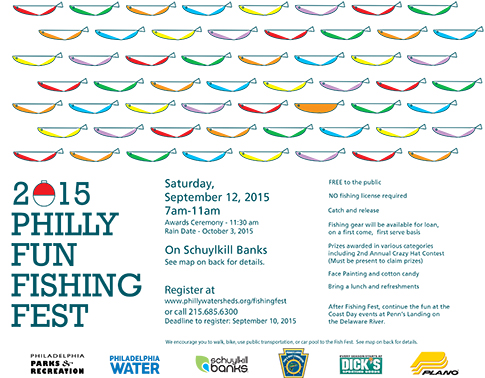Watch our video to learn more about the Philly Fun Fishing Fest.
There’s something about fishing—the wonder, perhaps, that you inevitably experience when you cast your line into the water and hope that something will appear, alive and fighting, on the other end—that makes it an especially potent way of getting people hooked on "watershed stewardship."
Being a watershed steward is a fancy way of saying you care about the rivers, streams, creeks, wetlands, brooks and bays around us; Philadelphia alone has seven watersheds, all of them feeding into the much larger Delaware River watershed, stretching from the cold, wild trout-filled streams of the Catskill Mountains in New York all the way down to the salty Delaware Bay, where blue crab and flounder swim.
We want everyone in the Philadelphia region to think of themselves as watershed stewards because people who care about the source of their drinking water make our job—protecting and treating that water—that much easier. Whether it’s voting for elected officials who care about water quality or just picking up pet waste to keep it from washing into rivers and streams, we can count on watershed stewards to be on our side when it comes to making sure the Delaware watershed is in tip-top shape.
That’s the sentiment behind the Philly Fun Fishing Fest (Fish Fest for short), a Schuylkill River tradition now in its 11th year. It’s a day when anyone, old or young, fishing license or not, can come down to the banks of this amazing river and, we hope, make that special connection that leads to a life of watershed stewardship.
"Our source water protection efforts, from working with partners far upstream to reducing the amount of stormwater entering waterways from city streets, are all guided by our ‘One Water’ approach, which recognizes that everything we do comes back to the goal of having healthy rivers," says Tiffany Ledesma, a member of Philadelphia Water’s public engagement team. "Fish Fest is a great, fun way for people of all ages to experience what a healthy Schuylkill River has to offer in a hands-on way, and we want residents to have a direct stake in our efforts to take water quality to the next level."
This year’s Fish Fest, a totally free catch-and-release only event, will take place Saturday, September 12, from 7 a.m. to 11 a.m. (rain date: Oct. 3). Participants must register and fill out a quick form, which you can find by clicking here. The deadline for signups is Thursday, September 10. We’ll even have fishing poles available for loan and worms to use as bait. Experts will also be on hand to teach you how to cast and identify the fish species caught.
Prizes for a variety of categories, including the biggest (AND smallest!) fish, will be awarded during an 11:30 a.m. ceremony. To make the day even more fun, we’ll be holding the second annual Crazy Hat contest, open to all. Get creative with your head gear for the chance to reel in a prize!
What to Expect
Anglers during last year’s fest recorded nearly four dozen catches, and species identified included channel catfish, striped bass, bluegill, American eel, American shad, white perch, pumpkinseed sunfish, and red-breast sunfish.
Philly Fun Fishing Fest 2014: See Photos from Last Year, Including Fish Measuring and Crazy Hats
REMEMBER: Registration and Release of Liability are required to fish at the Fishing Fest. The registration must be completed ahead of time and the release form must be brought on the day of the event in order to participate. Register here and download the Release of Liability here. Questions? Call : 215-685-6300 or email us at StreetGreening@gmail.com.
Philadelphia Water’s partners for this event include Philadelphia Parks & Recreation, the Pa. Fish and Boat Commission, Schuylkill Banks, Dick’s Sporting Goods, and Plano Tackle.
Want to Spread the Word? Download a Fish Fest Flyer by Clicking the Image Below:
